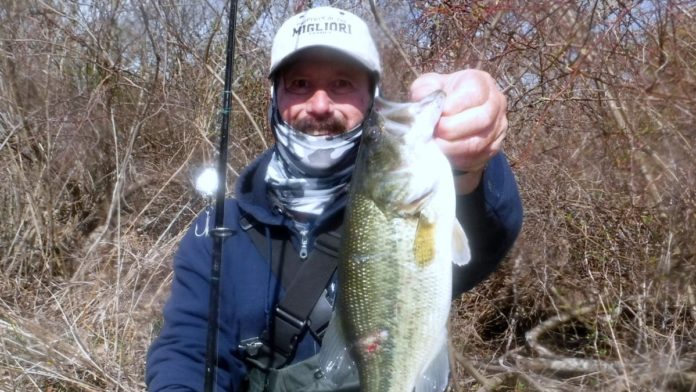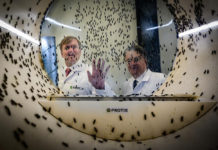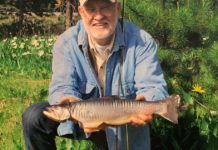“I’ve been catching striped bass to 36 inches from my kayak in South County, Rhode Island, ponds since December,” said Todd Corayer, a light-tackle fly-fishing expert and publisher of the Fish Wrap blog.
“The fish are covered in sea lice, so it would lead you to believe that the water temperature was plenty warm for them to stay rather than migrate south. They have been hammering silversides, peanut bunker and some larger Atlantic menhaden, too.”
Fishing frenzy: Anglers and fish were hungry for action this year
“We do not have enough research on some stocks like false albacore and bonito,” said William Goldsmith, executive director of the American Saltwater Guides Association. “They are important to recreational fishing but are not commercially harvested and have taken a back seat.”
Both Corayer and Goldsmith were panelists last week at the 2022 Baird Symposium held virtually by the Rhode Island Sea Grant Program at the University of Rhode Island Graduate School of Oceanography. They were joined by Greg Vespe, executive director of the Rhode Island Saltwater Anglers Associaton who facilitated a panel of charter captains and anglers. Jon Hare, director of the National Oceanic and Atmospheric Association’s Northeast Fisheries Science Center (recently appointed the acting chief science adviser of NOAA) and Pam Rubinoff, Coastal Management and Climate Extension specialist from Rhode Island Sea Grant, rounded out the science panel that followed.
The consensus of panelists was that climate change is affecting recreational fishing and boating in a number of ways and anglers and boaters are adapting new strategies and tactics to adapt. Fish here in greater abundance include black sea bass, sea robins and scup. Exotica warm-water fish and pelagic fish are here in greater abundance also. These species would include mahi, bluefin tuna, wahoo and cobia and all are being targeted and caught in or off Rhode Island, Massachusetts and Connecticut.
The second session of the virtual 2022 Baird Symposium series will be held from 6:30 to 8 p.m. April 13. The webinar, “Climate Change Opportunities for Anglers and Boaters,” will engage anglers, boaters and climate experts in discussions about how anglers are adapting, with the science panel addressing “Big Strategies for Climate Resiliency.” To register for the event, visit Effects of Climate Change on Recreational Fishing and Boating — Session II Tickets at Eventbrite.com. Event supporters include Rhode Island Sea Grant at URI, Ørsted and the Ocean Conservancy.
NOAA Recreational Summit also focuses on climate
This week, I was at the NOAA Recreational Fishing Summit in Crystal City, Virginia. The Summit happens every five years to gather input from anglers to help establish a strategic direction for NOAA Fisheries recreational fishing research, programs and policies. It was great to have our national fishing agenda in line with input heard at the Baird Symposium in Rhode Island.
Janet Coit, assistant administrator for Fisheries at NOAA and former director of the Rhode Island Department of Environmental Management, led a panel discussion on Climate Resilient Fisheries.
“I ask you to engage in conversations, be respectful and have a frank back and forth on the issues,” Coit said. “Be creative. … I assure you this summit is not just about dialogue; it’s about action.”
Topics covered at the summit include climate impacts on fishing and habitat and how to work toward climate-resilient fisheries; the balancing of ocean uses, including fishing, offshore wind energy and aquaculture; recreational data collection and use; and management reform. NOAA plans to publish a report on the summit.
Recreational fishing regulations
Rhode Island
Tautog. Last week, Terrance Gray, acting director of the Rhode Island Department of Environmental Management, approved the tautog regulation of five fish/angler/day, minimum size 16 inches, with only one of the five fish to be 21 inches or larger. “The aim of the regulation change is to protect larger female fish with great spawning potential,” said Greg Vespe, executive director of the Rhode Island Saltwater Anglers Association. The number of fish in the fall season will remain at five fish per angler rather than the RISAA-preferred four fish per angler.
Black sea bass, scup and summer flounder. The Rhode Island Marine Fisheries Council is scheduled to review recreational fishing regulations for black sea bass, scup and summer flounder at its meeting at 6 p.m. April 4 at the Corless Auditorium on the URI Bay Campus in Narragansett. Visit Marine Fisheries Public Meetings at dem.ri.gov for meeting details. Click on the calendar meeting date of April 4 for information and the agenda.
Massachusetts
Black sea bass, summer flounder, scup. The Rhode Island Division of Marine Fisheries and the Marine Fisheries Advisory Commission reviewed potential recreational fishing limits for black sea bass, summer flounder and scup for 2022. It was determined that DMF would move forward with the following anticipated limits — black sea bass, May 21-Sept. 4, four fish/angler/day, 16-inch minimum size; summer flounder, May 21-Sept. 29, five fish/angler/day, 16.5-inch minimum size; scup, private vessels and shore, Jan. 1- Dec. 31, 30 fish (150 fish/vessel maximum), 10-inch minimum size; scup for-hire vessels, Jan. 1-April 30 and July 1-Dec. 31, 30 fish/angler/day, 10-inch minimum size, and from May 1–June 30, 50 fish/angler/day, 10-inch minimum.
Where’s the bite?
Freshwater opening day of trout season is Saturday, April 9. Rhode Island is ready with trout stocked in more than 85 waterways. For regulations, license information and stocked ponds, visit dem.ri.gov/programs/fish-wildlife/freshwater-fisheries/index.php. “My favorite spinner bait worked this week for largemouth bass and pickerel,” said John Migliori of Aquidneck Island. “I have been just switching out hook sizes depending on the species I was targeting.” ”
Dave Monti holds a captain’s master license and charter fishing license. He serves on a variety of boards and commissions and has a consulting business that focuses on clean oceans, habitat preservation, conservation, renewable energy and fisheries-related issues and clients. Forward fishing news and photos to dmontifish@verizon.net or visit noflukefishing.com.
Credit: Source link































